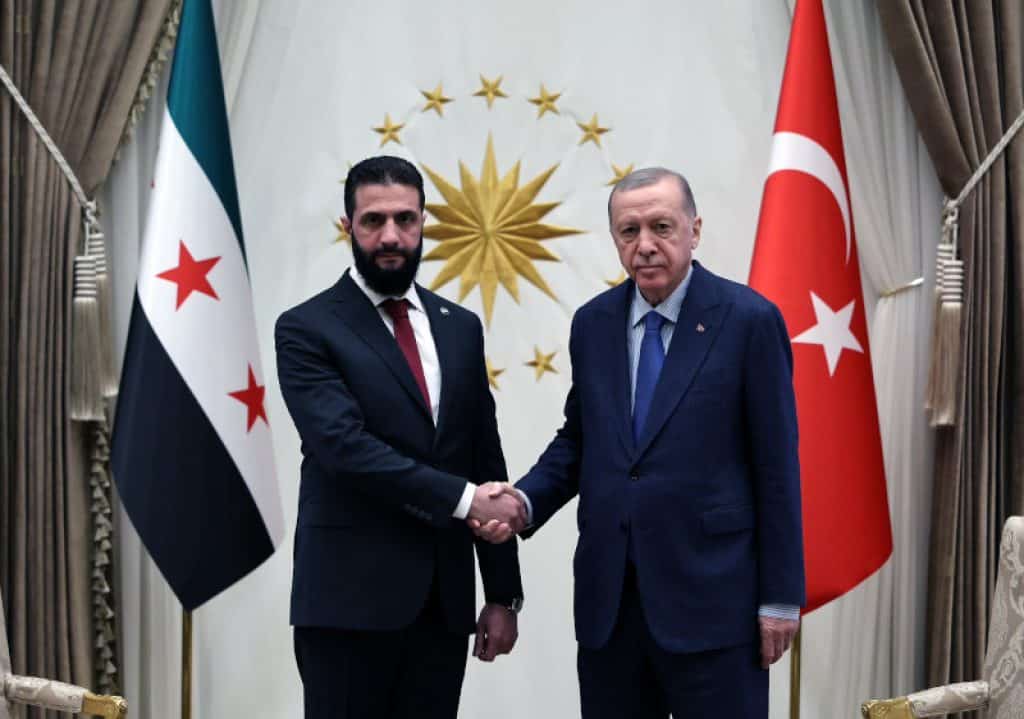
Reports circulating on Syrian social media claim that Syrian interim President Ahmad al Sharaa is planning a visit to meet Turkish President Recep Tayyip Erdogan to finalize a defense and military agreement between the two countries. These reports are unconfirmed but not without precedent. Prior to Sharaa and Erdogan’s February meeting, Reuters reported that the two leaders were discussing a defense pact.
Before Hayat Tahrir al Sham (HTS), a US-designated terrorist group, ousted Syrian dictator Bashar al Assad in December 2024, the organization’s relationship with Turkey was defined by a combination of pragmatic cooperation and deep-seated mistrust. Initially, Turkey designated HTS as a terrorist organization due to its extremist ideology and ties to Al Qaeda. However, HTS’s strategic recalibrations, particularly its actions against Islamic State strongholds in northwestern Syria, paved the way for cooperation with Ankara. HTS allowed Turkish patrols to operate within territories it controlled and the establishment of Turkish observation posts in northern Syria.
HTS has even positioned itself as a gatekeeper for Ankara, curbing drug trafficking into Turkey, preventing Islamic State infiltration, and apprehending individuals wanted by Turkish authorities. Then-HTS leader Ahmad al Sharaa, long known by his nom de guerre Abu Mohammad al Jolani, also allegedly supported Turkish military operations east of the Euphrates, according to a report by the Turkey-based Syria TV.
The number of Turkish troops present in Syria has fluctuated since December, but Turkey’s influence continues to grow. Turkish and Syrian officials are discussing allowing Ankara to create and use military bases inside Syria and train Syrian soldiers, further solidifying a foothold. This presence is reinforced by the presence of foreign advisors, military officers embedded in the new Syrian army, pro-Turkey proxies integrated into its ranks, and Turkish-backed figures securing top positions within Syria’s military.
Reports on Turkey’s role in shaping Syria’s new military structure
A source in the Turkish Ministry of Defense stated that Turkey is continuing to study the establishment of a military base in Syria for training purposes, aiming to enhance the capabilities of the Syrian army. Previous reports indicated that Turkish officials have been assessing potential sites for these bases.
Israeli media reports claim that Prime Minister Netanyahu has held security consultations to address concerns over Turkey’s growing influence in Syria, portraying a confrontation with Ankara as inevitable.
According to the Israeli news site Walla, security sources revealed that Syria and Turkey are in talks about handing over areas near Palmyra—previously a stronghold for Iranian-backed militias in Syria. The Syrians would receive economic and military support in exchange.
One of the reported planned bases will be an airbase in central Syria, hosting Turkish F-16 fighter jets. The Turkish army is already stationed in various parts of northern Syria, and under apparent agreements with Syria’s transitional leadership, some Turkish forces will relocate to other areas inside the country.
Meanwhile, Ankara is still assessing the creation of a training base to strengthen the Syrian army, following the Syrian government’s request. Additionally, a five-party meeting in Jordan resulted in an agreement to support Syria in its fight against terrorism. There is also a consensus among the involved nations to establish a joint operations center at Syria’s request.
Turkish media reported that a military delegation will be sent to Syria to discuss training the Syrian army, with the possibility of a Turkish officer being appointed as a military advisor. This development coincides with the appointment of Turkish nationals and pro-Turkey individuals to key positions within the newly structured army.
One prominent example is Omar Jaftashi (Mukhtar al Turki), a Turkish national and former member of Hayat Tahrir al Sham, who now commands the Damascus Division. Jaftashi played a critical role in coordinating between HTS and Turkey’s intelligence agency, MIT, and is reported to have maintained close ties with Turkish intelligence.
In addition, Turkish-backed militias from the Syrian National Army have been integrated into the unified Syrian army. While this integration has been rushed—leaving many of these factions still loyal to their local commanders and Turkey—it cements Ankara’s influence over Syria’s military structure.
For instance, Mohammad al Jasem (Abu Amsha), leader of the Sultan Suleiman Shah Brigade, was appointed commander of the Hama Division (62nd Division). Jasem is sanctioned by the United States for human rights abuses against Kurdish populations and was accused of committing violations against the Alawite community during the March 2025 events near the Syrian coast.
Another Turkish proxy, Sayf Abu Bakr, was a former lieutenant in Assad’s Air Force Intelligence before defecting to the Turkish-backed Hamzat Division. Reports suggest he may have also been affiliated with the Islamic State, appearing in a propaganda video for the group. Bakr was appointed commander of the 76th Division in the Syrian army and, like Jasem, is sanctioned by the United States for human rights abuses against Kurds.







